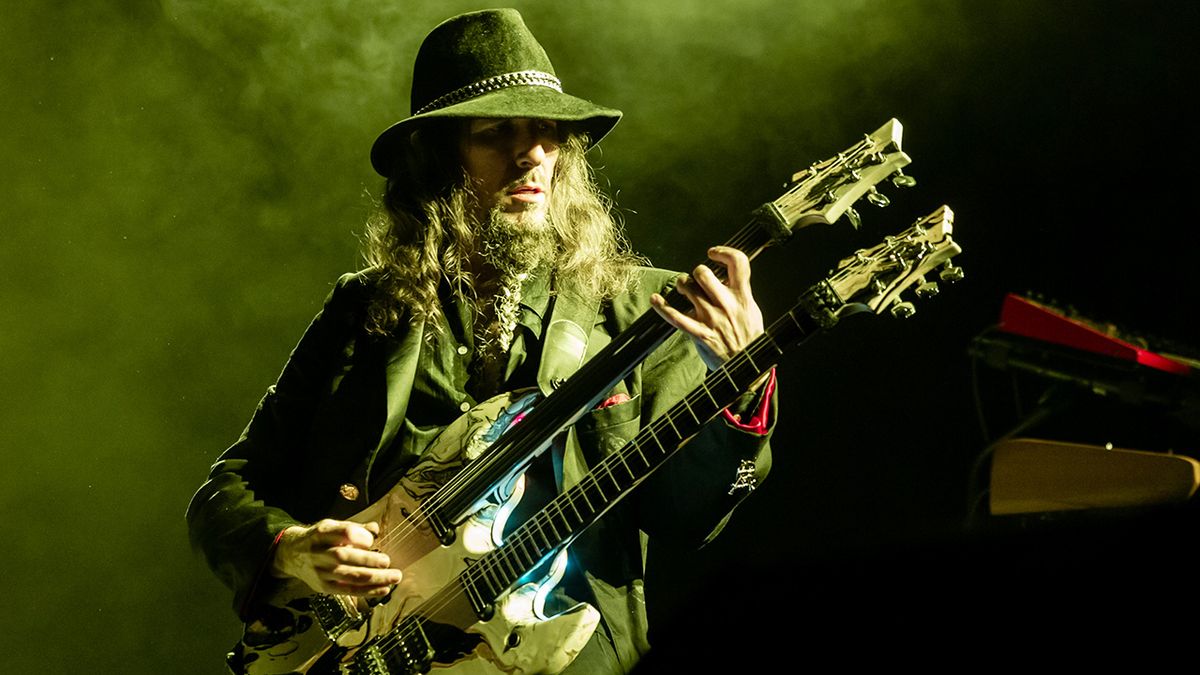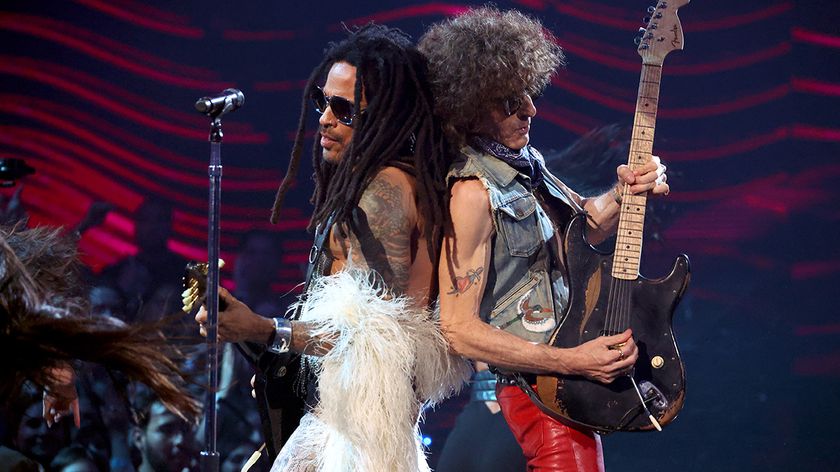"I’ve been using Vigier guitars since 1997. One of their reps had me try them, but I didn’t want to – I’d been playing my own awful, homemade, Swiss cheese guitars!" Failed luthier Ron ‘Bumblefoot’ Thal is busier than ever, but success isn't on his mind
The former Guns N’ Roses man discusses giving up constructing his own instruments, learning how to sing like a bassist while playing like a guitarist for Asia, and the upcoming Art of Anarchy record

Brooklyn native Ron ‘Bumblefoot’ Thal has been around for decades. At the tail end of the so-called ‘shred era,’ a 19-year-old Thal’s demo tape was tabbed by producer Mike Varney as “amongst the most impressive ever received.” Not too shabby, eh?
And with that praise came a deal with Varney’s Shrapnel Records and a solo career featuring blistering affairs like The Adventures of Bumblefoot (1995), Hermit (1997), and Hands (1998), before – on a recommendation from Joe Satriani – Thal found himself, starting in 2006, in Axl Rose’s company as one half of Guns N’ Roses’ two-guitar attack.
Thal toured the world, lent his licks to Chinese Democracy (2008), and hung around until 2014, two years after which Slash returned to the fold. Guns aside, Thal continued his fruitful solo and production career and helped kick off the fruitful supergroups Sons of Apollo and Art of Anarchy. The latter is significant now, as Sons of Apollo appear to be no more, while Art of Anarchy are preparing to drop their third record, Let There Be Anarchy, in February.
Asked about the record’s backstory, Thal says, “I’d say it sounds a lot more like the first album [Art of Anarchy] than the second [The Madness]. But it’s just the Votta brothers [Jon and Vince] unfiltered, and throws back to the beginning of the band. The first singer we had was Scott Weiland, and it was phenomenal. But some things took some turns and – I want to avoid the negative dirt – we needed another singer because Scott abandoned the project.”
On how the end of Sons of Apollo impacted Art of Anarchy, Thal says, “We had a lot of trouble finding singers. I had been working with Jeff [Scott Soto] in Sons of Apollo, so we brought him in. We started recording and Jeff said, ‘If you had me here from the beginning, you wouldn’t have had all these problems.’ And he was right – everything would have been smooth. The good news is that Jeff is here now, and he’s given the band what it needs.”
In support of Let There Be Anarchy, Bumblefoot dialed in with Guitar World to talk solos, riffs, gear, and the importance of freeing his mind in an era where he sees himself as “retired.”
One would assume the Votta brothers do most of the writing in Art of Anarchy and loop you in later. How does that work for solos?
Get The Pick Newsletter
All the latest guitar news, interviews, lessons, reviews, deals and more, direct to your inbox!
“I keep things spontaneous. But when I’m recording, some of that ends up being a placeholder, and maybe I’ll keep it if it sounds good, or maybe I’ll have to work on it after. But I’ve always subscribed to the theory that if it feels right in the moment to begin with, it’s probably right.”
It’s ultimately about the song first and what the fingers want last
So that’s solos, but what about riffs?
“A lot of times, if there’s a certain riff, I’ll feel like it’s icing on the cake. Maybe I’ll add a melody or an extra riff. The Votta brothers do a lot of writing, but I did a decent amount of writing for this record, too.
“I see my role as 50 percent guitarist and 50 percent producer because I’m the one who is recording all this stuff. And then I’m doing the mixing and mastering, which is my biggest love above all else these days.”
Does your role as producer affect how you approach the guitars?
“I’d say they help each other. When you’re wearing both hats, it can keep you from going off the rails. The production side keeps me from getting too whacked out and keeps me focused on what’s best for the song.
“But there is the element of being a guitar player, where I always want to come up with something that’s not typical. Doing both lets me incorporate both of those worlds. It’s ultimately about the song first and what the fingers want last.”
Which tools are you leaning on most to aid in finding that balance?
“I’ve been a total Line 6 Helix guy for around five years. With that thing, I can do anything you can imagine. There are no limits. It would be impossible for me to do some of the stuff that thing does with other gear. It’s so easy and sounds great.”
What about Vigier guitars? Are you still primarily using them?
“I am. I’ve been primarily using those since 1997. While doing a clinic tour in France, I came upon them, and one of their reps came out to have me try them. But I didn’t want to – I’d been playing my own monstrous, awful homemade guitars, like Swiss cheese guitars! But, he insisted. I tried it, and it was so much better than my stuff.
“I’m not a guitar builder – that I decided to leave that to the professionals and use something I couldn’t deny was better. They’re great guitars by a boutique company that doesn’t mass produce, so getting a guitar from them takes time. But they put a lot of time into the fit and finish, so it’s worth it.”
Sons of Apollo are reportedly no more – but is it a challenge being a member of so many supergroups?
“The biggest challenge is scheduling. Everybody is always doing their stuff, and it’s hard to find a moment where we’re all free simultaneously. That’s harder than any personality shit. And the actual playing is never a problem – it’s all scheduling. It’s not exclusive, so it’s hard to come together and get things done when everyone has other shit going on.”
You work with many young players and do your best to champion them. What’s your stance on how players are discovered these days, versus how Mike Varney discovered you?
“Much of it is social media, which brings a new set of good and bad stuff. The good is that anybody can show anything to the world immediately. We could only dream of that 30 years ago. Now, people can release music and perform live virtually, and it’s incredible.
John Wetton’s stuff comes from the brain of a bass player, and Steve Howe comes from a guitar player. It was such a challenge to split my brain, coordinate all that, and then get it down to where it was effortless
“But with that, there’s no steadier stream, no labels pushing distribution, not as much radio push or putting things in stores. There’s so much music available now, which can be wonderful, as gatekeepers don’t bind it. So, the big challenge now is not so much about performing but awareness – letting people know you exist.”
Would you say that’s a hindrance for the old guard of guitar?
“I’m in this weird mental place where I consider myself retired, which makes no sense because I have three albums coming out soon! I’m busier than ever, but I don’t give a fuck about trying to have a successful career.

“Being successful by the standard definition means nothing to me. I’ve done enough for one lifetime. I just do whatever the fuck I want now and keep the pressure off. There’s freedom in that and less worry about survival. I’m 54 now; I’ll be okay. And if I die tomorrow, I’ll feel like I lived a well-lived life. Now, it’s about whatever is genuine, natural, and authentic for me.
“If you can affect one person with your music, you’ve done something special with your life. Beyond that, I don’t worry about a fucking thing anymore.”
People often mention Guns N’ Roses, but you’ve said your greatest point of pride is your time with Asia. Why?
“Oh, man, fronting Asia in 2019 and opening for Yes was amazing. That was my greatest challenge because I had to relearn how to sing to sound like John Wetton. And then I had to learn all the Steve Howe guitar parts.
“John Wetton’s stuff comes from the brain of a bass player, and Steve Howe comes from a guitar player. It was such a challenge to split my brain, coordinate all that, and then get it down to where it was effortless.”
Beyond Art of Anarchy, what’s next?
“Much bandwidth went into Sons of Apollo, regarding writing and recording, but I’m freed up now. So I’ve got an instrumental guitar album coming in early ’24. I'd hoped to get it out in ’23, but I’ve been so busy. The music is done – now I want to transcribe it and get an animated video done. I’ve got some great guests on there, which I will reveal in time.
“Beyond that, I’ve been working with Derek Sherinian and Simon Phillips, I’m doing some producing, and I’ve been working with an 18-year-old guitarist named Sierra Levesque, an amazing player. She’s terrific and is going to shine. A lot is coming up – but again, I’m retired!”
- Art of Anarchy's Let There Be Anarchy is set for release on February 16, and is available for pre-order now.
Andrew Daly is an iced-coffee-addicted, oddball Telecaster-playing, alfredo pasta-loving journalist from Long Island, NY, who, in addition to being a contributing writer for Guitar World, scribes for Bass Player, Guitar Player, Guitarist, and MusicRadar. Andrew has interviewed favorites like Ace Frehley, Johnny Marr, Vito Bratta, Bruce Kulick, Joe Perry, Brad Whitford, Tom Morello, Rich Robinson, and Paul Stanley, while his all-time favorite (rhythm player), Keith Richards, continues to elude him.

“We had 15 minutes left, and it was time to go… I just started playing that riff. Then Lenny goes, ‘Whoa, what’s that?’”: Lenny Kravitz guitarist Craig Ross reveals the serendipitous roots of a Kravitz classic

“The concept of the guitar duel at the end was just appalling”: Crossroads is an essential piece of '80s guitar lore, but not every guitar legend was a fan of the film













